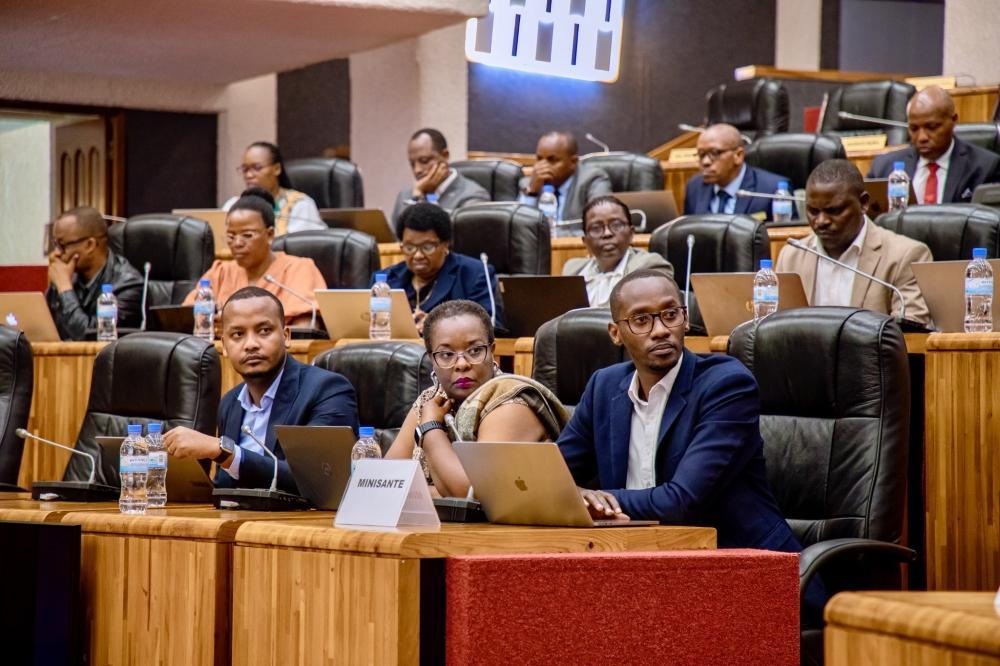Africa-Press – Rwanda. Dr Eugene Ngoga, a gynecologist, recalls a tragic incident two decades ago when a pregnant woman arrived at the University Teaching Hospital of Kigali (CHUK) in critical condition. She was near delivery and had a dangerously low hemoglobin level, which meant that she had anaemia.
Despite the urgency, Dr Ngoga said, her husband and family refused to allow a blood transfusion, saying their religion did not allow such medical treatment. Both the woman and her unborn child died as a result.
“Since then, it has been a deep pain in my heart,” Ngoga said. “I think that in such emergencies, doctors should be able to act. And if we are taken to court, there should be a clear legal framework to protect us.”
Ngoga attended a parliamentary session on Wednesday, April 30, when the Committee on Social Affairs consulted healthcare entities to provide their inputs to a draft law regulating healthcare services before MPs vote on it.
The bill seeks to address such dilemmas. It proposes that, under certain circumstances, medical professionals may treat patients without their informed consent to save lives.
While Article 24 of the bill affirms the patient’s right to informed consent, Article 26 outlines specific exceptions that allow treatment without consent.
According to Article 24, a patient must give consent before undergoing any medical procedure. If the patient is illiterate, the consent form must be read aloud to them before they affix their fingerprint. For minors or individuals with mental disabilities or sensory impairment, consent is provided by their legal representative.
Article 25 guarantees a patient’s right to refuse treatment or withdraw previously given consent. This decision must be documented in writing and entered into the patient’s medical file by the attending healthcare professional.
However, Article 26 states that in cases where the patient’s life is at risk or where public or global health interests are concerned, a team of at least three qualified healthcare professionals can decide to proceed with treatment without the patient’s consent. This decision must also be documented and justified in the patient’s medical file.
Bernard Rugamba, a legal adviser to Rwanda Medical and Dental Council, pointed out inconsistencies in the draft law that could put doctors and patients in a deadlock.
“Article 25 grants an absolute right to refuse treatment, while Article 26 gives a medical team of three health professionals the authority to override that refusal in certain cases. This contradiction needs to be clarified,” Rugamba said.
Lisine Tuyisenge, a pediatrician at CHUK, expressed concern over situations in which healthcare workers are prevented from performing lifesaving procedures—especially blood transfusions—due to a patient’s or guardian’s refusal. She cited Jehovah’s Witnesses as an example.
“As health professionals, do we just stand by and watch as a patient dies?” she asked, adding doctors are “frustrated” by such cases.
She pointed out that CHUK adopted a policy allowing doctors to proceed with blood transfusions for minors if their lives are in danger, despite objections from their parents.
“Some parents even report us to the police for administering blood into their children against their will,” she said.
She also mentioned cases of women who have heavy bleeding after childbirth who still refuse transfusions.
She underscored the need for a legal exception that protects both the lives of patients and respects religious beliefs. Tuyisenge stressed the need for a clear limit on treatment refusal, especially in critical situations, including when patients undergo surgery and suffer from heavy bleeding.
Dr. Athanase Rukundo, acting Head of Clinical and Public Health in the Ministry of Health, said the bill does contain provisions allowing treatment without consent and acknowledged that further improvements could be considered, if need be.
For More News And Analysis About Rwanda Follow Africa-Press






